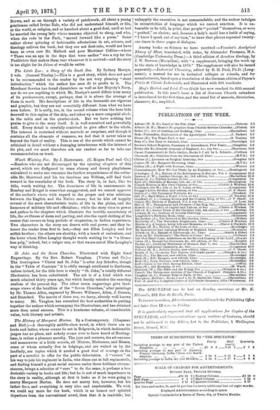Worth Waiting For. By J. Masterman. (C. Kogan Paul and
Co.) —Readers who are not discouraged by the opening chapters of this novel, which are disfigured by some clumsy and dreary playfulness calculated to make one renounce the further acquaintance of the estim- able Mr. Sherwood and his too facetious son William, will find their reward in the remainder of the book. The story is, in fact, like its title, worth waiting for. The dreariness of life in cantonments in Bombay and Bengal is somewhat exaggerated, and we cannot approve of the author's views with regard to the proper and wise relations between the English and the Native races; but he hits off happily Several of the most characteristic traits of life in the plains, and the humours of military life and officialism; while the story rises to power and pathos in tho chapters which illustrate the terrible uncertainty of life, the swiftness of doom and parting, and also the rapid shifting of the scenes that ensues on long periods of stagnation, in Indian experience. Two characters in the story are drawn with real power, and they in- terest the reader from first to last,—they are Ellen Longley and hor selfish brother; tbe others aro sketchy, with a touch of caricature, and the lover whom Ellen Longley thought worth waiting for is "a blame- less prig," indeed, but a vulgar one, so that we are not of Miss Longley's way of thinking.


































 Previous page
Previous page